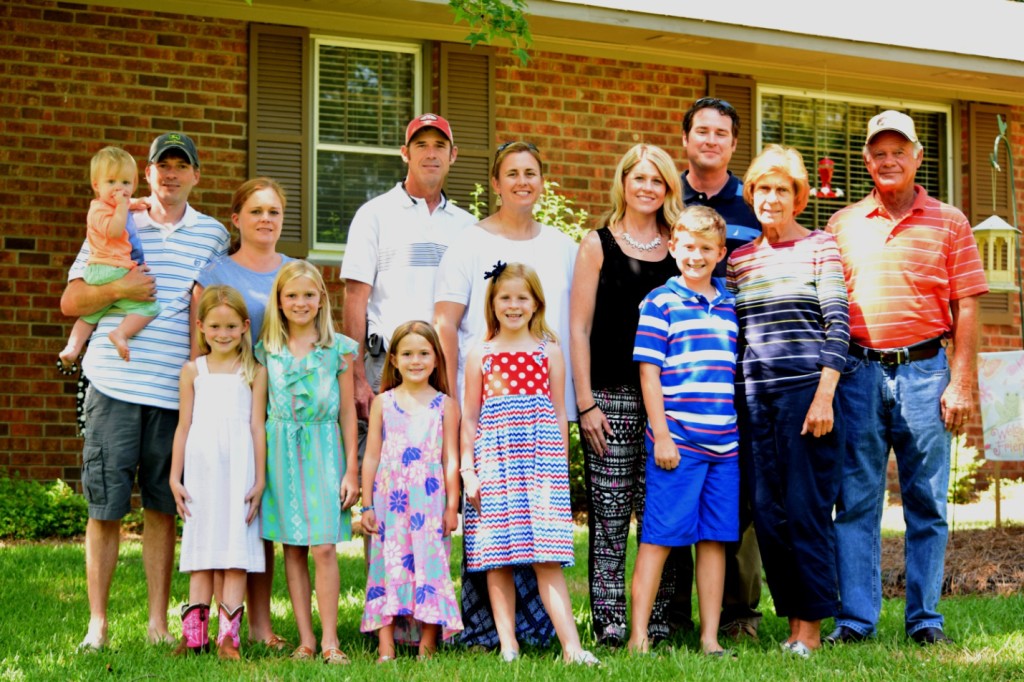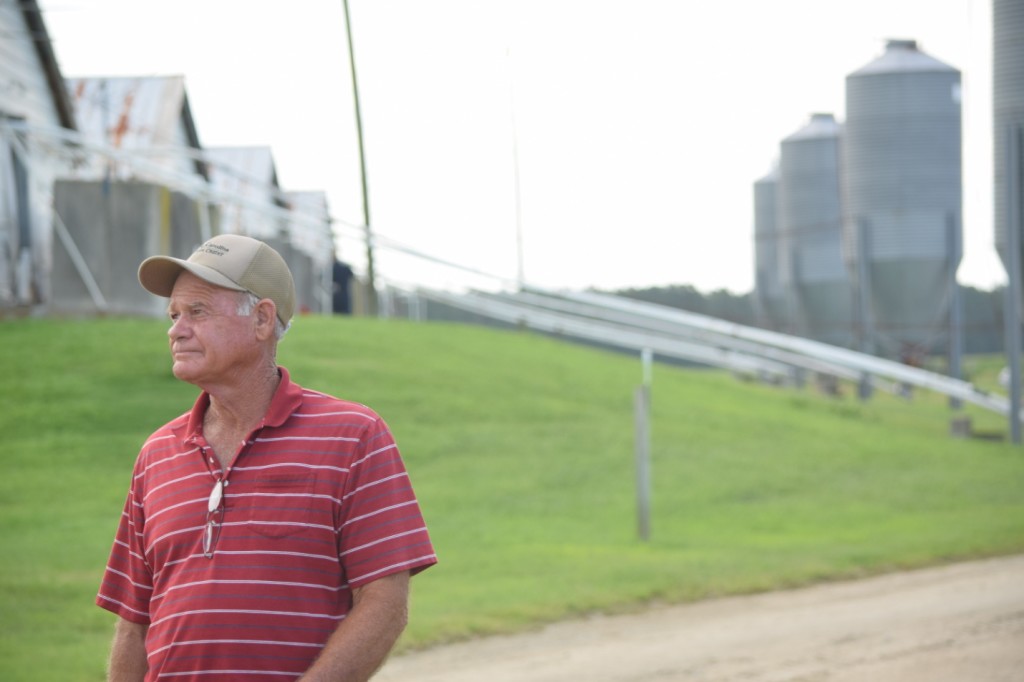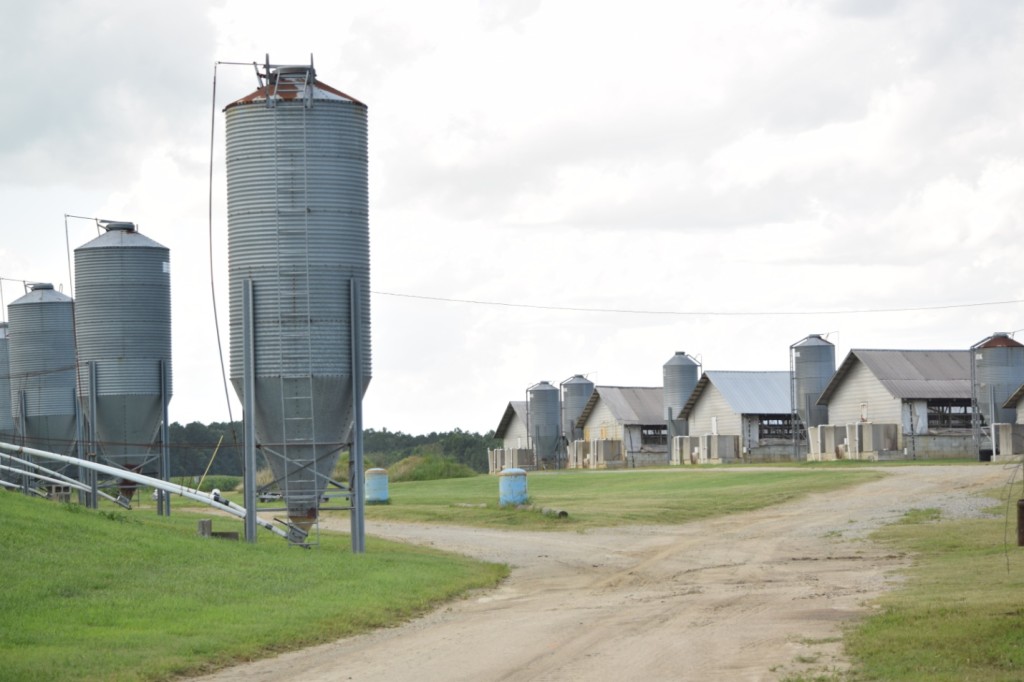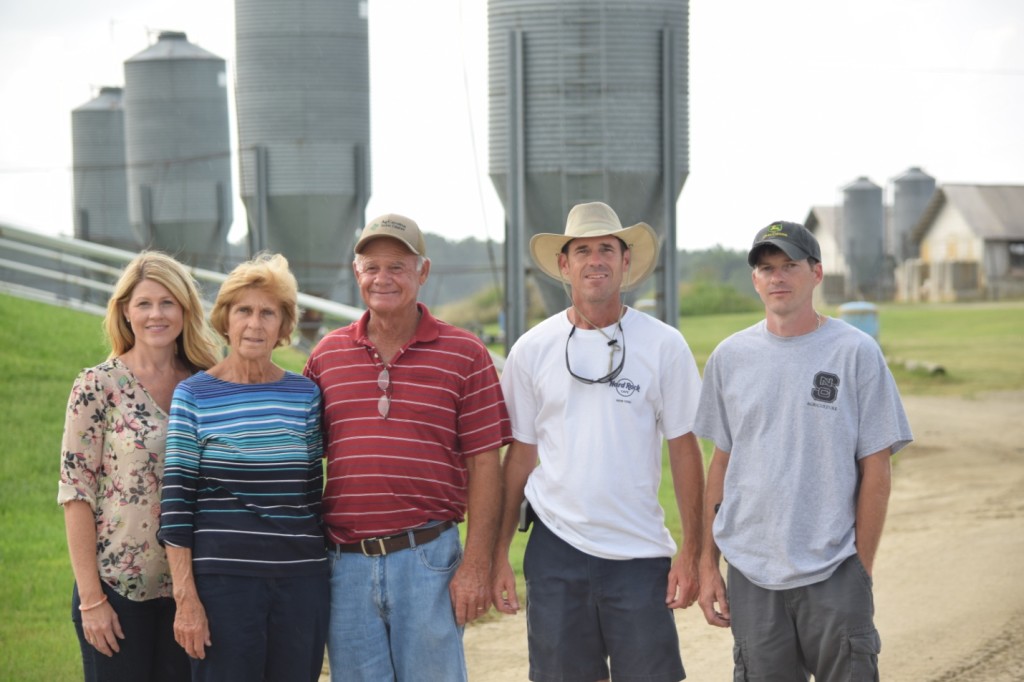https://www.youtube.com/watch?v=tozzvFUSy0MIn December of 2010, the Taylor family thought they had bought a hog farm that would expand their current operation and allow their son to come home and farm. They thought they had found a good deal. What they did not know was that they had entered into a nightmare which would begin just 29 days after the purchase of their farm.Annie Taylor received a phone call from a local newspaper asking how she felt about her lawsuit. She had no idea what lawsuit they were talking about. She soon discovered that the environmental group, The Waterkeeper Alliance, had sent an intent to sue against her and husband Donnie for violations of the Clean Water Act occurring on the farm they had not even owned for a month. This was the start of a five year litigation, that is still going on today. Despite what the Taylors call an unreal experience, they have continued to cling to the three F's--Faith, Family, and Farm. Donnie and Annie Taylor have built their life and family around farming for the last 47 years, growing more than chickens, hogs, tobacco, corn, and soybeans....they have grown their family on the farm too. The couple has three children (Johnnie, Sheila, and Jason) who all live locally with their families. Both of their sons manage parts of the family farm. Donnie and Annie also have six grandchildren who are their pride and joy. From the youngest Taylor to the oldest, farming is in their blood, and they would not have it any other way."I would take nothing from the fact that my children have grown up on a farm. They know what it is to work. It has been worth it," said Annie Taylor as her family collectively agreed with her.However, those many years of hard work, building their family's future, is now under attack from environmental groups including the Waterkeeper Alliance and Neuse River Keepers. These groups had investigated the Taylor farm three years prior to the Taylors purchasing the farm and sent an intent to sue on the previous owners. When the groups learned of the change in ownership, they included Donnie and Annie within the intent as well; however, the first way the Taylors even discovered their involvement in the lawsuit was through the media's questions to the family. They were then sent the notice several weeks later by certified mail in January 2011.Shocked and horrified at the revelation of being included in a lawsuit, the Taylors were determined to do whatever they could to fix their alleged transgressions, although they had only just purchased the farm and had not even pumped an ounce of hog waste. Avid fishermen themselves, the Taylors are committed to maintaining good practices that do not harm the environment. Following regulations and being good stewards is at the top of their list. Eager to get the matter resolved, the Taylors met with the groups in a mediation process to discuss what was desired of them and present their plan for improvements. The farm had been neglected and regulations had been disregarded by previous owners, and the Taylors wanted to explain their five year plan to rectify the former owner's indiscretions. Rather than being fruitful, the mediation proved frustrating and disheartening. The environmentalist groups did not care to hear the Taylors' plan to bring the farm to par. Instead, they told the Taylors to get a lawyer because there was enough evidence to take them to court that very day. The Taylors were confounded and felt threatened. They continued to try to mediate for six months, but to no avail.Five years and more than $600,000 in legal fees later, the environmental groups are still searching for the evidence which they previously claimed to already have. The courts have granted the activist groups permission to go onto the farm and take soil, lagoon, and water samples up to four different times between March and May 2015. They were also allowed to go inside the actual hog barns, despite issues with disease and bio-security that the entire hog industry had been struggling with that year. In addition to what the courts have allowed them to do, the activists have repeatedly driven to the entrance of the property to film and take pictures and flown above the farm with aircraft, often multiple times in a week. "They passed the drone law, but they can take an airplane and do the same thing. That is an invasion of privacy, because it gives you anxiety, " said Jason. To which his mom added, "You wouldn't want them flying over your house everyday like that." The farm is an extension of their home. Many memories are made, and lessons are learned there; yet, they have to deal with the constant air traffic and cameras at the gate entrance. It is not a good feeling for others to be allowed to traipse through your property and home and take pictures.It is not just an invasion of privacy that the Taylors feel, but a constant, inescapable weight that literally hovers above them. "It is both a financial and emotional weight. It has taken all of our cash-- any funds that we had, and it drains you emotionally to the point where it is just unbearable almost. It is like a nightmare that you hope is gone when you wake up, but it is still right there every day, everyday," said Donnie Taylor as he shook his head.
Donnie and Annie Taylor have built their life and family around farming for the last 47 years, growing more than chickens, hogs, tobacco, corn, and soybeans....they have grown their family on the farm too. The couple has three children (Johnnie, Sheila, and Jason) who all live locally with their families. Both of their sons manage parts of the family farm. Donnie and Annie also have six grandchildren who are their pride and joy. From the youngest Taylor to the oldest, farming is in their blood, and they would not have it any other way."I would take nothing from the fact that my children have grown up on a farm. They know what it is to work. It has been worth it," said Annie Taylor as her family collectively agreed with her.However, those many years of hard work, building their family's future, is now under attack from environmental groups including the Waterkeeper Alliance and Neuse River Keepers. These groups had investigated the Taylor farm three years prior to the Taylors purchasing the farm and sent an intent to sue on the previous owners. When the groups learned of the change in ownership, they included Donnie and Annie within the intent as well; however, the first way the Taylors even discovered their involvement in the lawsuit was through the media's questions to the family. They were then sent the notice several weeks later by certified mail in January 2011.Shocked and horrified at the revelation of being included in a lawsuit, the Taylors were determined to do whatever they could to fix their alleged transgressions, although they had only just purchased the farm and had not even pumped an ounce of hog waste. Avid fishermen themselves, the Taylors are committed to maintaining good practices that do not harm the environment. Following regulations and being good stewards is at the top of their list. Eager to get the matter resolved, the Taylors met with the groups in a mediation process to discuss what was desired of them and present their plan for improvements. The farm had been neglected and regulations had been disregarded by previous owners, and the Taylors wanted to explain their five year plan to rectify the former owner's indiscretions. Rather than being fruitful, the mediation proved frustrating and disheartening. The environmentalist groups did not care to hear the Taylors' plan to bring the farm to par. Instead, they told the Taylors to get a lawyer because there was enough evidence to take them to court that very day. The Taylors were confounded and felt threatened. They continued to try to mediate for six months, but to no avail.Five years and more than $600,000 in legal fees later, the environmental groups are still searching for the evidence which they previously claimed to already have. The courts have granted the activist groups permission to go onto the farm and take soil, lagoon, and water samples up to four different times between March and May 2015. They were also allowed to go inside the actual hog barns, despite issues with disease and bio-security that the entire hog industry had been struggling with that year. In addition to what the courts have allowed them to do, the activists have repeatedly driven to the entrance of the property to film and take pictures and flown above the farm with aircraft, often multiple times in a week. "They passed the drone law, but they can take an airplane and do the same thing. That is an invasion of privacy, because it gives you anxiety, " said Jason. To which his mom added, "You wouldn't want them flying over your house everyday like that." The farm is an extension of their home. Many memories are made, and lessons are learned there; yet, they have to deal with the constant air traffic and cameras at the gate entrance. It is not a good feeling for others to be allowed to traipse through your property and home and take pictures.It is not just an invasion of privacy that the Taylors feel, but a constant, inescapable weight that literally hovers above them. "It is both a financial and emotional weight. It has taken all of our cash-- any funds that we had, and it drains you emotionally to the point where it is just unbearable almost. It is like a nightmare that you hope is gone when you wake up, but it is still right there every day, everyday," said Donnie Taylor as he shook his head. Amidst the lawsuit, the Taylors also had to deal with Hurricane Irene 10 months after the purchase of the farm, damaging many of the farm buildings, and juggled heavy rainfall for several years in a row. The only violation they have incurred despite all of this, is a high free board (high lagoon levels) due to the excess rain. They have worked tirelessly to keep lagoon levels at appropriate levels, even paying out close to $100,000 to contract honey wagons to haul excess water away from the farm during periods of excessive rainfall.Annie noted how her husband was supposed to be retired, but in the past five years has worked harder than ever. Farming is hard work in the first place, but this situation has made it all that much harder. The Taylor's youngest son, Jason, explained how it is hard to go to work every day, knowing that what you are working so hard for on the farm could end up costing you everything else that you own. Work is a constant reminder of their plight. Even for the family members who have outside jobs, the situation looms over their heads.The Taylor's daughter, Sheila Sutton, said, "I work an 8-5 job, and even though I don't have to go and see and endure what they have to every day, I feel like I take it with me to work. You can't get away from it."The farm has been inspected by the Environmental Protection Agency (EPA), Division of Energy and Natural Resources (DENR), Division of Water Quality (DWQ), and Carl Dunn, a state engineer. They have all found the farm to be following all regulations and maintained in a proper manner. Many have even commented how many improvements the family has made to the farm, cleaning and fixing it up. Improvements have included hiring a crew to haul away an open dumping site from the previous owners that took five tractor trailer loads. They have cut all of the overgrown vegetation, and people have noticed. They have been approached to take care of an extra 500 acres by neighboring properties because of their notable stewardship.
Amidst the lawsuit, the Taylors also had to deal with Hurricane Irene 10 months after the purchase of the farm, damaging many of the farm buildings, and juggled heavy rainfall for several years in a row. The only violation they have incurred despite all of this, is a high free board (high lagoon levels) due to the excess rain. They have worked tirelessly to keep lagoon levels at appropriate levels, even paying out close to $100,000 to contract honey wagons to haul excess water away from the farm during periods of excessive rainfall.Annie noted how her husband was supposed to be retired, but in the past five years has worked harder than ever. Farming is hard work in the first place, but this situation has made it all that much harder. The Taylor's youngest son, Jason, explained how it is hard to go to work every day, knowing that what you are working so hard for on the farm could end up costing you everything else that you own. Work is a constant reminder of their plight. Even for the family members who have outside jobs, the situation looms over their heads.The Taylor's daughter, Sheila Sutton, said, "I work an 8-5 job, and even though I don't have to go and see and endure what they have to every day, I feel like I take it with me to work. You can't get away from it."The farm has been inspected by the Environmental Protection Agency (EPA), Division of Energy and Natural Resources (DENR), Division of Water Quality (DWQ), and Carl Dunn, a state engineer. They have all found the farm to be following all regulations and maintained in a proper manner. Many have even commented how many improvements the family has made to the farm, cleaning and fixing it up. Improvements have included hiring a crew to haul away an open dumping site from the previous owners that took five tractor trailer loads. They have cut all of the overgrown vegetation, and people have noticed. They have been approached to take care of an extra 500 acres by neighboring properties because of their notable stewardship. With all of the farm expenses and over $600,000 in legal fees, the family has been bled dry to the point of bankruptcy. They are in danger of losing their farm, as well as their home. This does not just affect Donnie and Annie, but at least five other families. Both of their sons help manage the farms. In fact, the farm under scrutiny was bought so that Jason, their youngest son, could move back home to the farm. Their daughter and her family have been affected , and two families who work for the Taylors also have the potential to lose their jobs. Donnie and Annie have six grandchildren that are all under the age of 9. They are too young to understand what is going on; they just know they love living on a farm and spending time with their Nana who watches them and takes them places daily."That is how she has survived this," said Donnie as Annie agreed full-heartedly.Despite being in the midst of such an awful time, the Taylors are concerned for their fellow farmers. They are keenly aware that if the activists win this case, then rules will be changed that affect the entire farming community."This could happen to them. They don't always understand that we are a stepping stone ; you know a spring board for the next farm, and the next farm, and the next farm," Sheila admonished.The Taylors want their story to be told so that maybe someone else can be saved the heartache that they have suffered."It may be too late for us, but if we can help somebody else...that is why we are doing this," Donnie said emotionally.Many have referred to the Taylor farm as industrial, but in reality, they are a family farm under attack. Donnie and Annie are in their 60's. Farming is all they know; yet, they are faced with losing their livelihood, home, and legacy. They do not know what will happen. They can only keep faith, cling to family, and keep farming as long as they are able-- Faith, Family, Farm.
With all of the farm expenses and over $600,000 in legal fees, the family has been bled dry to the point of bankruptcy. They are in danger of losing their farm, as well as their home. This does not just affect Donnie and Annie, but at least five other families. Both of their sons help manage the farms. In fact, the farm under scrutiny was bought so that Jason, their youngest son, could move back home to the farm. Their daughter and her family have been affected , and two families who work for the Taylors also have the potential to lose their jobs. Donnie and Annie have six grandchildren that are all under the age of 9. They are too young to understand what is going on; they just know they love living on a farm and spending time with their Nana who watches them and takes them places daily."That is how she has survived this," said Donnie as Annie agreed full-heartedly.Despite being in the midst of such an awful time, the Taylors are concerned for their fellow farmers. They are keenly aware that if the activists win this case, then rules will be changed that affect the entire farming community."This could happen to them. They don't always understand that we are a stepping stone ; you know a spring board for the next farm, and the next farm, and the next farm," Sheila admonished.The Taylors want their story to be told so that maybe someone else can be saved the heartache that they have suffered."It may be too late for us, but if we can help somebody else...that is why we are doing this," Donnie said emotionally.Many have referred to the Taylor farm as industrial, but in reality, they are a family farm under attack. Donnie and Annie are in their 60's. Farming is all they know; yet, they are faced with losing their livelihood, home, and legacy. They do not know what will happen. They can only keep faith, cling to family, and keep farming as long as they are able-- Faith, Family, Farm. "I truly believe there will be a happy ending. I really do. I believe with all my heart that God has a plan. We are going to be fine. We might not be rich, but we've never been rich. We have, as a family, hung in here together--we're going to be fine," Annie said tearfully.You can help the Taylor family by donating here and telling their story. Most importantly, you can support our North Carolina Farm Families!
"I truly believe there will be a happy ending. I really do. I believe with all my heart that God has a plan. We are going to be fine. We might not be rich, but we've never been rich. We have, as a family, hung in here together--we're going to be fine," Annie said tearfully.You can help the Taylor family by donating here and telling their story. Most importantly, you can support our North Carolina Farm Families!
The Taylor Story: Faith, Family, Farm
in News Article
